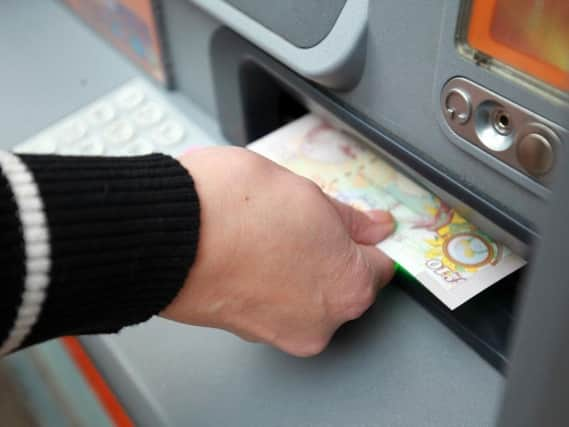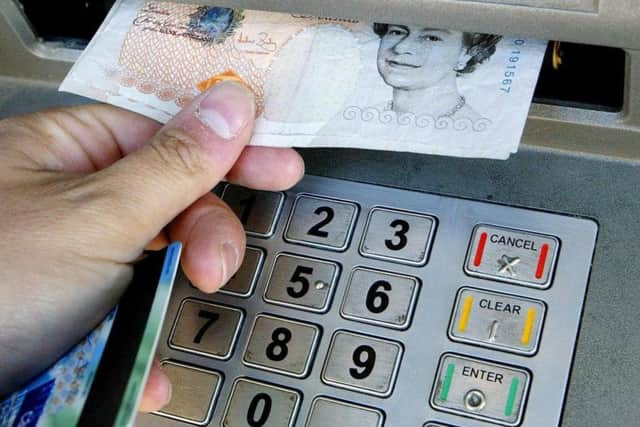Huw Merriman: We must ensure vulnerable can access cash as Post Offices, bank branches and ATMS close


At a time when 2.2 million people in the UK rely almost entirely on cash it is critical that people can gain access to their money easily and free of charge, particularly people on low incomes, older people and people in rural areas.
However, figures show that since the beginning of the year, free cash machines have been closing at an unprecedented rate. That has alarmed consumer groups, the Federation of Small Businesses and MPs.
Advertisement
Hide AdAdvertisement
Hide AdIt may help if I try to put my finger on the reason for the decline in cash machines, and hence the reason why intervention is needed.


Earlier this year, LINK, the UK’s largest cash machine network, announced that it would go ahead with plans to cut its interchange fee by 20 per cent over the next five years.
Hundreds of free ATMs have already closed as a result. The interchange fee is the amount that is paid every time a customer uses a free ATM, which funds the entire free-to-use ATM network.
The change was designed to reduce the number of machines in areas where there were too many, while retaining the geographical coverage of ATMs across the UK. That has failed.
Advertisement
Hide AdAdvertisement
Hide AdIn 2018, analysis of LINK data showed that in the six months following LINK’s initial announcement – from November 2017 to April 2018 – the rate of cashpoint closures increased significantly. It went from about 50 a month in 2015 to 300 a month during that period. LINK’s own figures show that between January and June this year, 500 cashpoints closed every month.
In January 2018, the consumer group Which? conducted a study of ATM provision across the UK, and identified more than 200 communities with poor ATM provision or no cash machines at all. The threat of ATM closures is particularly pertinent in the context of widespread bank branch closures across the country. Research shows that free ATMs are an important alternative for consumers trying to access their cash when their local branch closes, but latest figures show that bank branches are closing at a rate of 60 a month.
The UK has lost almost two thirds of its bank branches in the past 30 years. According to Parliamentary records, there were 20,583 branches in 1988, but analysis of current account providers shows that there are just 7,586 today. So far this year 670 branches have closed or are scheduled for closure, putting us on course to overtake the number of 2017 closures.
Some might say that cash provision should be taken up by the Post Office network. I know that the Government recognise the important role post offices play by providing access to cash and banking services.
Advertisement
Hide AdAdvertisement
Hide AdUnder the banking framework, 99 per cent of UK personal banking customers and 95 per cent of UK business banking customers can do their day-to-day banking at the Post Office. That agreement, in operation since January 2017, marked the biggest expansion of face-to-face banking access in a generation. However, post offices and postmasters and postmistresses do not feel that the banks are remunerating them properly for these transactions, and I fear that many will stop providing the service, just as LINK has ceased providing cash machines.
High street banks have a very special place in my heart. I spent my vacations during A-levels and university working as a cashier for Abbey National. I was responsible for the morning refill of the cash machine – a job they might not have given me if they had known I would become an MP.
Many a happy hour was spent with my customers, from “accidentally on purpose” setting off the cashier security screens when a customer was rude to colleagues, to repeatedly asking our customer, Mr R. Head, to produce his identification so that we could roll about on the floor laughing when his driving licence showed his first name to be Richard.
Or taking a phone call from an irate customer concerned about overdraft charges and then phoning the cheque centre with the opening line of “Some old bag is complaining about racking up charges” only to be informed by the voice at the other end of the line “This is the old bag speaking. I suggest you reimburse the charges or I will have you fired”. I had rung the customer back by mistake – a schoolboy error.
Advertisement
Hide AdAdvertisement
Hide AdFortunately, my pursuit of customer satisfaction has improved steadily over the years prior to me becoming my constituency MP. When vulnerable constituents, who are the most in need of our support, cannot access their cash and spend it in support of the stores that make up our vibrant high streets then something is not only wrong, but something needs to be done.
Huw Merriman is a Conservative MP who has introduced a Bill on cashpoint provision to the House of Commons this week. This is an edited version.